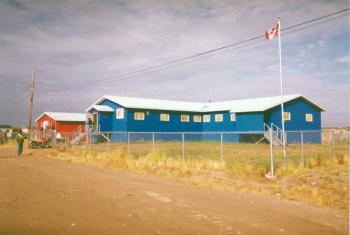Please support our coverage of democratic movements and become a monthly supporter of rabble.ca.
Both First Nations education and the Assembly of First Nations face uncertain futures after an extraordinary Chiefs' meeting and the predictable Conservative government reaction that followed.
Gathered in Ottawa on Tuesday for a special assembly, Chiefs and their proxies rejected the Conservatives' Bill C-33 but called for the government to start flowing the $1.9 billion in new education funding the Prime Minister had promised.
Wasting no time in responding, Aboriginal Affairs Minister Bernard Valcourt's office said, "Our Government is extremely disappointed that the Assembly of First Nations (AFN) did not honour its agreement with the government." Pressed to identify that dishonoured agreement, Minister Valcourt's office admitted nothing had been signed, but claimed that the media event accompanying the announcement of funding constituted a deal.
As I said in my last post on this issue, Harper Wins, First Nations lose, there never was a deal. The Harper government misrepresented the entire affair. Those who claimed that former National Chief Atleo had sold out First Nations got played. That this led directly to his resignation is the responsibility of both the Conservative government and Atleo's critics alike.
Laid bare in this process are growing divisions among First Nations.
Some of the conflict has deep roots. The existence of treaties that speak to federal responsibilities for education in Alberta, Saskatchewan, Manitoba and Ontario is one of the most significant, while the fact that legislation already exists for First Nations education in B.C. and Nova Scotia may play an equally important role.
But some of the conflict is simply a difference of approach. There is a willingness by some to compromise principles for the practical benefits of promised funding. Others are committed to making their local education programs work despite underfunding, pointing to the retention of federal control in Bill C-33 as the bigger problem. For still others, the issue is personal political ambition.
The disrespectful tone of debate in Tuesday's assembly -- including a serious breach of protocol by Chiefs shouting down those who had the floor -- suggests that these divisions will not be reconciled easily. Mistrust of the AFN executive only adds to that challenge. And confusion over the role of the Confederacy of Nations within the AFN, a body that has not formally existed for over a decade, is not helping to clarify matters.
Underlying all of this is the growing division over the function of the AFN itself.
There has long been concern that the AFN cannot provide sufficiently independent advocacy for First Nations interests because it relies on the federal government for funding. But that criticism has reached a new level over the past two years.
The unremitting hostility of the Harper government toward the legal rights and legitimate aspirations of First Nations and the accompanying diminishment of those rights and interests are undoubtedly significant factors in this shift. In addition, the emerging role of social media and Indigenous academics in informing and catalyzing First Nations citizens have spurred an upsurge in engagement and activism among those who refer to themselves as "grassroots." This gave rise to the Idle No More movement and has driven increasingly vocal criticism of both the government and the AFN from many First Nations leaders.
Dubbing those critics as "rogue Chiefs," Minister Valcourt has only thrown fuel on the fire. The fact that the resolutions that emerged from Tuesday's assembly were supported by a majority of those in attendance has also shown that, far from being rogue, the number willing to take a stronger stand is greater than those who are willing to co-operate any further with the Harper government.
All of this leaves First Nations with no plans for addressing the dysfunctional relationship governing education on reserve and no expectation of redressing the continued underfunding. Nor, despite AFN plans to hold a general assembly in Halifax this July, are there clear plans for filling the vacant position of National Chief. And dialogue about the form and function of the AFN, and even its existence, continues.
Dissatisfaction with the status quo and no small degree of desperation has led to internal criticism and hostility -- lateral violence -- within the Indigenous rights movement. Shawn Atleo was a victim of this lateral violence.
Meanwhile, Stephen Harper and Bernard Valcourt, having orchestrated the dissension that now marks First Nations politics at the national level, will do nothing to address the growing inequality in funding of First Nations education and will leave the education system itself as dysfunctional as ever. They must be very pleased with themselves.




Comments
Do
Don't